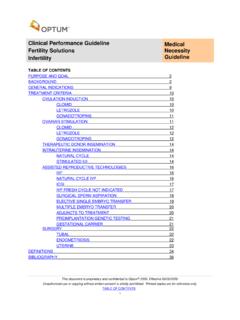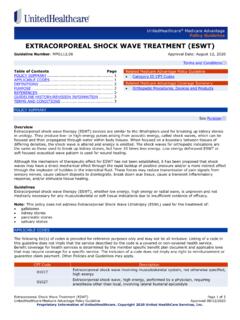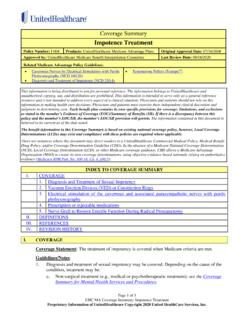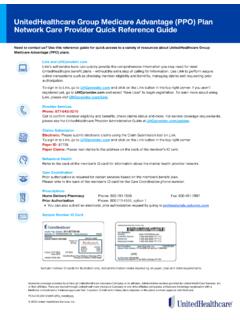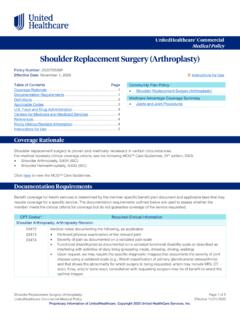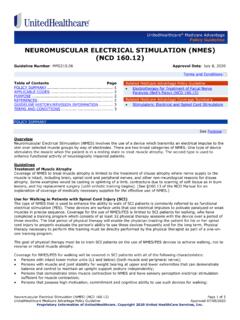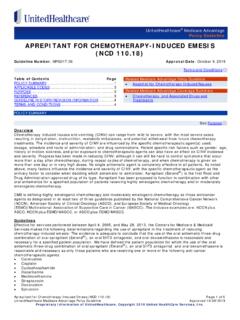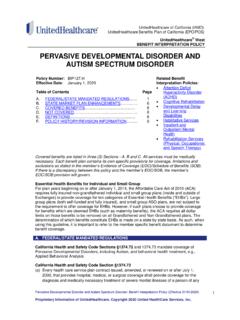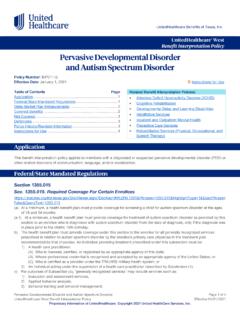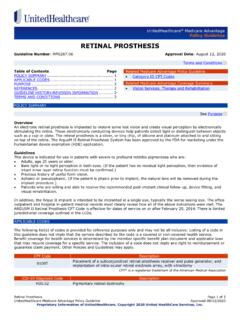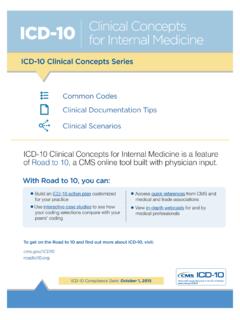Transcription of Molecular Diagnostic Infectious Disease Testing
1 Molecular Diagnostic Infectious Disease Testing Page 1 of 23 UnitedHealthcare Medicare Advantage Policy Guideline Approved 01/12/2022 Proprietary Information of UnitedHealthcare. Copyright 2022 United HealthCare Services, Inc. UnitedHealthcare Medicare Advantage Policy Guideline Molecular Diagnostic Infectious Disease Testing Guideline Number: Approval Date: January 12, 2022 Terms and Conditions Table of Contents Page Policy Summary .. 1 Applicable Codes .. 3 Questions and Answers .. 19 References .. 19 Guideline History/Revision Information .. 22 Purpose .. 23 Terms and Conditions .. 23 Policy Summary See Purpose Overview Molecular Diagnostic Testing , which includes Deoxyribonucleic Acid-(DNA) or Ribonucleic Acid-(RNA) based analysis (with or without amplification/quantification) provides sensitive, specific and timely ( , relative to that of traditional culture-based methods) identification of diverse biological entities, including microorganisms and tumors.
2 A standardized nucleic acid probe reacts directly with nucleic acids in the test sample. This format is termed a Nucleic Acid Test (NAT). If the test sample contains the organism of interest, the reaction ( , hybridization) of these elements will create a detectable endpoint. The NAT amplification format is termed a Nucleic Acid Amplification Test (NAAT). The NAAT format increases Diagnostic sensitivity by decreasing the lower limit of detection. Several techniques are available to perform such amplification, but one example is the polymerase chain reaction in which logarithmic copies of baseline nucleic acid material can be replicated via cyclical reactions involving primer nucleic acid, enzymes and requisite heating/cooling parameters. Finally, there may be a need for the above process to quantify rather than simply detect the presence of certain microorganisms.
3 Examples include Human Immunodeficiency Virus (HIV), hepatitis C and Cytomegalovirus (CMV) treatment, which can require such quantitative monitoring to determine if therapy is producing the intended reductions in circulating levels of virus. Related Medicare Advantage Policy Guidelines Clinical Diagnostic Laboratory Services Molecular Pathology/ Molecular diagnostics /Genetic Testing Screening for Sexually Transmitted Infections (STIS) and High-Intensity Behavioral Counseling (HIBC) to Prevent STIS (NCD ) Related Medicare Advantage Reimbursement Policies Clinical Laboratory Improvement Amendments (CLIA) ID Requirement Policy, Professional Laboratory Services Policy, Professional Related Medicare Advantage Coverage Summaries Genetic Testing Laboratory Tests and Services Preventive Health Services and Procedures Molecular Diagnostic Infectious Disease Testing Page 2 of 23 UnitedHealthcare Medicare Advantage Policy Guideline Approved 01/12/2022 Proprietary Information of UnitedHealthcare.
4 Copyright 2022 United HealthCare Services, Inc. Furthermore, other techniques ( , nucleic acid sequencing) are utilized to assay antiviral resistance signatures for HIV-1 and hepatitis C. Either genotypic or phenotypic analysis can allow therapy to be directed in response to such observed resistance markers. Guidelines Multiplex Nucleic Acid Amplified Tests for Respiratory Viral Panels Medicare limits coverage of multiplex PCR respiratory viral panels. Panels of 3-5 pathogens are covered under limited circumstances. Specifically the test must be ordered either in a healthcare setting that is equipped to care for and routinely does care for critically ill patients, or it must be ordered by an Infectious Disease specialist, unless an Infectious Disease specialist is not available. Multiplex PCR respiratory viral panels of 6 or more pathogens are non-covered.
5 The pathogen targets that compose the panels are determined by the manufacturers that make them, and do not represent specific pathogens that cause a common syndrome, or the organisms that commonly are found in a specific sample type or patient population or reflect seasonal variations. The fixed nature of these multiplex panels includes pathogens that cause infections different enough that simultaneous Testing for these pathogens should be rare. Examples include Chlamydophila (Chlamydia) pneumoniae or Bordetella pertussis in combination with rhinovirus, influenza viruses, and respiratory syncytial virus (RSV). The multiplex PCR respiratory viral panels are effectively a one size fits all Diagnostic approach, and do not meet Medicare s reasonable and necessary criteria. Non-coverage of these multiplex RCR respiratory viral panels does not deny patient access because appropriate clinician directed Testing is available.
6 Gastrointestinal Pathogen (GIP) Panels Utilizing Multiplex Nucleic Acid Amplification Techniques (NAATs) Medicare provides limited coverage for Gastrointestinal Pathogen (GIP) Molecular assays identified by multiplex nucleic acid amplification tests (NAATs). See Local Coverage Determination (LCD) References section for coverage details. Coverage varies by LCD. Based on the Centers for Medicare & Medicaid Services (CMS) Program Integrity Manual (100-08), this policy addresses the circumstances under which the item or service is reasonable and necessary under the Social Security Act, 1862(a)(1)(A). For laboratory services, a service can be reasonable and necessary if the service is safe and effective; and appropriate, including the duration and frequency that is considered appropriate for the item or service, in terms of whether it is furnished in accordance with accepted standards of medical practice for the diagnosis of the patient's condition; furnished in a setting appropriate to the patient's medical needs and condition; ordered and furnished by qualified personnel; one that meets, but does not exceed, the patient's medical need; and is at least as beneficial as an existing and available medically appropriate alternative.
7 Compliance with the provisions in this policy is subject to monitoring by post payment data analysis and subsequent medical review. Title XVIII of the Social Security Act, Section 1862(a)(1)(A) states " ..no Medicare payment shall be made for items or services which are not reasonable and necessary for the diagnosis and treatment of illness or ". Furthermore, it has been longstanding CMS policy that "tests that are performed in the absence of signs, symptoms, complaints, or personal history of Disease or injury are not covered unless explicitly authorized by statute". Screening services, such as pre-symptomatic genetic tests and services, are those used to detect an undiagnosed Disease or Disease predisposition, and as such are not a Medicare benefit and not covered by Medicare. Similarly, Medicare may not reimburse the costs of tests/examinations that assess the risk for and/or of a condition unless the risk assessment clearly and directly effects the management of the patient.
8 However, Medicare does cover a broad range of legislatively mandated preventive services to prevent Disease , detect Disease early when it is most treatable and curable, and manage Disease so that complications can be avoided. These services can be found on the CMS website at Many applications of Molecular Diagnostic procedures are not covered services by Medicare given lack of benefit category (preventive service) and/or failure to reach the reasonable and necessary threshold for coverage (based on quality of clinical evidence and strength of recommendation). Furthermore, payment of claims in the past (based on stacking codes) or in the future (based on the new code series) is not a statement of coverage since the service was not audited for compliance with program requirements and documentation supporting the reasonable and necessary Testing for the beneficiary.
9 Certain tests Molecular Diagnostic Infectious Disease Testing Page 3 of 23 UnitedHealthcare Medicare Advantage Policy Guideline Approved 01/12/2022 Proprietary Information of UnitedHealthcare. Copyright 2022 United HealthCare Services, Inc. and procedures may be subject to prepayment medical review (records requested) and paid claims must be supportable, if selected, for post payment audit. Tests for diseases or conditions that manifest severe signs or symptoms in newborns and in early childhood or that result in early death ( , Canavan Disease ) could be subject to automatic denials since these tests are not usually relevant to a Medicare beneficiary. documentation Guidelines documentation must be adequate to verify that coverage guidelines listed above have been met. Thus, the medical record must contain documentation that the Testing is expected to influence treatment of the condition toward which the Testing is directed.
10 The laboratory or billing provider must have on file the physician requisition which sets forth the diagnosis or condition that warrants the test(s). Examples of documentation requirements of the ordering physician/nonphysician practitioner (NPP) include, but are not limited to, history and physical or exam findings that support the decision making, problems/diagnoses, relevant data ( , lab Testing , imaging results). documentation requirements of the performing laboratory (when requested) include, but are not limited to, lab accreditation, test requisition, test record/procedures, reports (preliminary and final), and quality control record. documentation requirements for lab developed tests/protocols (when requested) include Diagnostic test/assay, lab/manufacturer, names of comparable assays/services (if relevant), description of assay, analytical validity evidence, clinical validity evidence, and clinical utility.
